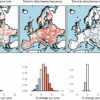Most people want to do something about climate change, but lifestyle trade-offs and a narrowing window to enact broad changes to industrial, transportation, and consumption patterns are daunting enough to make them resist.
Resistance has different meanings across different fields of study. But UCLA biologists who study resistance in the natural world believe insights gleaned from some of its smallest inhabitants could help identify barriers to social changes, including those required to resolve human–wildlife conflicts, and formulate specific strategies for overcoming them.
Biologists have long studied how agricultural pests become resistant to pesticides and how bacteria evolve antibiotic resistance. UCLA researchers have pinpointed several effective tactics to counter this resistance that could help humans embrace urgently needed changes in a paper published in Evolutionary Applications.
The team built a framework of biologically derived resistance management strategies, suggesting that the different views of resistance can help to identify friction points between humans and the natural world, and between humans and their social worlds.
“We’ve learned a lot from decades of agricultural and biomedical research about biological resistance and our goal with the paper was to identify lessons and think about their broad application,” said corresponding author Daniel Blumstein, an evolutionary biologist in UCLA’s department of ecology and evolutionary biology. “We noted that to prevent or manage resistance, we need to carefully select the treatment that is least likely to be overcome by an organism.”
The first tactic: Prevention. In agriculture, this involves planting diverse crops and rotating them to prevent establishment of pests that feed on specific crops. The same principle could be invoked to prevent human–wildlife conflicts by, for example, not building homes in bear habitats, the authors write. Where conflicts already exist, wildlife can be redirected and discouraged by various means, such as bear-resistant dumpsters.
“Adaptive therapy” combines a variety of control strategies that reduce pests or pathogens without killing all of them. A social application of this approach is “spare the air” days, when people are urged not to drive because air quality is particularly bad. This tactic mitigates, but doesn’t entirely eliminate, air pollution from vehicles.
Still, the growing resistance of many bacteria to antibiotics presents the most compelling case for the intimate influence of human behavior on biological evolution—and the urgency of changing this behavior. It is widely understood that overuse and misuse of antibiotics leave only the most resistant bacteria alive, leading to resistant populations. People take antibiotics for many conditions that don’t require them and often unnecessarily give them to livestock.
Changing human behavior around antibiotic use is crucial to prevent the emergence of new resistant bacterial strains and to restore vulnerability to resistant populations. The authors summarized other studies that showed how discouraging doctors from prescribing antibiotics without testing first to determine the most effective option—and banning antibiotic use in healthy farm animals—might help overcome the resistant behavior of bacteria.
The medical profession can also change the goal of treatment to symptom relief instead of eradicating the bacteria. This would leave some vulnerable individual bacteria that could be managed by natural immunological means, making it less likely the population as a whole will become resistant.
The final tactic is to deploy multiple approaches at the same time, such as the drug cocktail used to treat HIV and prevent evolution of resistant strains of the virus.
No one tactic will be sufficient to stop climate change in its tracks.
“To tackle the climate emergency, we will likely need to use everything in our toolbox to bring about the rapid reduction in atmospheric carbon needed to stabilize or even reverse global warming,” Blumstein said.
For instance, we will have to make changes to our transportation, energy and food systems, he said. Ideally, they will be attractive changes such as affordable and reliable electric cars, convenient electric public transportation, and generous subsidies for replacing stoves and heaters with more efficient electric models.
“But even attractive changes will generate some resistance because it can be hard or expensive for people to make big changes to their lifestyles and routines,” Blumstein said. “The hope is that relatively few will resist changes to all of them simultaneously, and thus we will reduce our net fossil fuel and energy consumption. Even if there are a few holdouts who resist all change, enough people will jump on board to make a difference. Moreover, the sum of a lot of small changes can have a substantial impact.”
More information:
Daniel T. Blumstein et al, Biological lessons for strategic resistance management, Evolutionary Applications (2023). DOI: 10.1111/eva.13616
Provided by
University of California, Los Angeles
Citation:
How antibiotic-resistant bacteria can teach us to modify behavior (2023, December 27)



